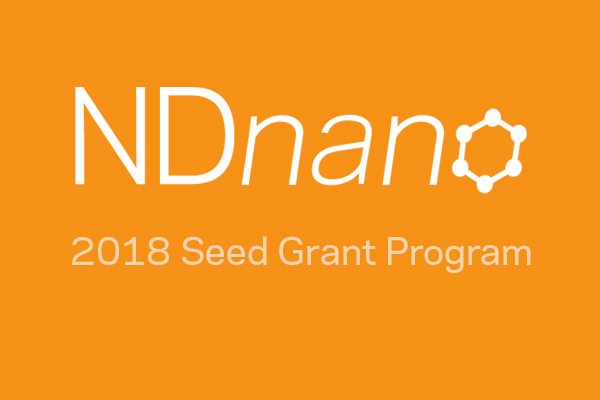
Nine faculty members from the University of Notre Dame’s College of Engineering and College of Science have been awarded four grants through the Center for Nano Science and Technology (NDnano) Seed Grant Program.
In discussing the awards, Alan C. Seabaugh, Frank M. Freimann Chair Professor of Electrical Engineering and director of NDnano, said, “We are excited to launch these four research collaborations, each building on materials innovations at Notre Dame. The research impacts a broad application space including opioid detection, water purification, molecular detection, and low power computing.”
The 2018 Seed Grant Program recipients are:
- Matthew Webber, assistant professor of chemical and biomolecular engineering, and Jon Camden, associate professor of chemistry and biochemistry, for their research called, “Supramolecular capture of fentanyl on nano-gold sensors.” This group will work to develop field-deployable detection devices for fentanyl, a pervasive opioid and chemical agent that poses safety and health risks from low-dose exposure.
- Haifeng Gao, associate professor of chemistry and biochemistry, David Go, Rooney Family Associate Professor of Engineering, and William Phillip, associate professor of chemical and biomolecular engineering, for their project titled, “Elucidating the influence of ferroelectric polarization on metal ion adsorption to the surface of nano-porous thin films.” This research team aims to create a new class of films to realize low-energy, high selectivity separation devices for diverse applications including water treatment and purification of therapeutics.
- Anthony Hoffman, associate professor of electrical engineering, and Ryan K. Roeder, professor of aerospace and mechanical engineering, for their research titled, “Polar nanoparticles: A new optical platform for the long-wavelength infrared.” This research will work to lay the foundation for the exploration of a diverse set of new materials for use in sensing and imaging of large molecules.
- Emily Tsui, assistant professor of chemistry and biochemistry, and Greg Snider, professor of electrical engineering, for their project called, “Synthesis and demonstration of switching in neutral mixed-valence molecular quantum-dot cellular automata.” This project will support a new collaboration in the area of low-power computing based on quantum-dot cellular automata with plans to use single-electron transistors charge switching in a new class of neutral mixed-valence molecules.
NDnano’s Seed Grant Program promotes interdisciplinary research in nanoscience and technology to enhance Notre Dame’s ability to address important scientific questions and to enable technical leaps.
The Center for Nano Science and Technology at the University of Notre Dame promotes collaborative research in science and engineering to address unsolved scientific and technical questions with an aim to promote the greater good. NDnano is where Notre Dame faculty, researchers, and students meet to broaden understanding, discuss multidisciplinary research opportunities, and shape future research directions. To learn more about NDnano, please visit nano.nd.edu.
Contact:
Heidi Deethardt / Center Coordinator
NDnano / University of Notre Dame
deethardt.1@nd.edu / 574.631.0279
About Notre Dame Research:
The University of Notre Dame is a private research and teaching university inspired by its Catholic mission. Located in South Bend, Indiana, its researchers are advancing human understanding through research, scholarship, education, and creative endeavor in order to be a repository for knowledge and a powerful means for doing good in the world. For more information, please see research.nd.edu or @UNDResearch.